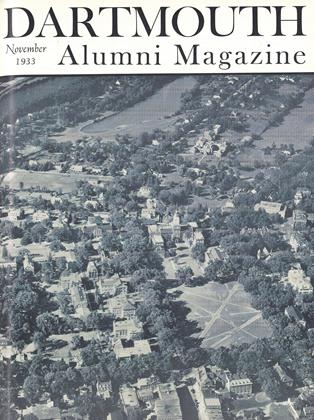UNTIL I READ this "regret list" (of theNational Commission to AdvanceAmerican Art), I didn't know that Dartmouth College had heard of Orozco or, for that matter, of mural painting. I thought Dartmouth was like most of the other colleges, innocent of such disturbing contacts. If Dartmouth and Amherst and Williams and Wesleyan and the rest are going to hell by undue encouraging of foreign mural painters, I can only say it's news to me! When the press gives space to these institutions, it's usually not for their mural infatuations!
If Dartmouth likes Orozco, quite a number of artists would say that Dartmouth has surprisingly good taste, and a college with good taste will doubtless notice sooner or later those American artists who deserve it. But the question comes up, will Dartmouth be permitted in course of time to choose the American painters she likes? Or will she run the risk of being pilloried again in another "regret list" by our new guardian angels?
Another question comes up. How much aid and comfort have these guardian angels themselves conferred on those American artists who are outside their particular school? I make no accusations, I merely ask. And the reason I ask is that I have never met a man who wished to close the door on things outside of America and who yet was broad-minded toward things inside. Once you begin shutting doors, the habit gets all through your system.
The only regret I should have would be lest any kind of good art failed to enjoy a hearing with us. The only thing which will advance American art is hospitality toward it, along with all other art. And if we must go narrow-minded, how absurd to begin with our Mexican neighbor! Dwight Morrow and other statesmen in our time have worked to bring us and our neighbor closer together, and chiefly through a better understanding of Mexico's art.
Until she got called down and spanked in public, poor Dartmouth probably thought she was contributing to our education by putting a fine example of Mexican art where the students could live with it and be at home in its influence.
In my opinion the Commission (National) to Advance American Art needs an elementary lesson in manners. It should apologize to Mr. Orozco, who is, as it were, an invited guest in the house, and it should apologize to the rest of us. If it won't apologize, it should be severely punished. It should be asked—all the members, I mean, of the Commission—to paint a picture which would be more helpful to American art than Mr. Orozco's, and the paintings should be exhibited beside his.
(Copyright, 1933, by John Erslcine)
 View Full Issue
View Full Issue
More From This Issue
-
 Sports
SportsFOLLOWING THE BIG GREEN TEAMS
November 1933 By C. E. Widmayer '30 -
 Article
ArticleHANOVER BROWSING
November 1933 By Rees H. Bowen -
 Class Notes
Class NotesClass of 1930
November 1933 By Albert I. Dickerson -
 Article
ArticleHistory of the Project
November 1933 By Prof. Artemas Packard -
 Class Notes
Class NotesClass of 1910
November 1933 By Harold P. Hinman -
 Class Notes
Class NotesClass of 1908
November 1933 By Laurence W. Griswold







